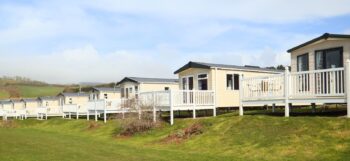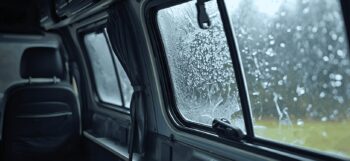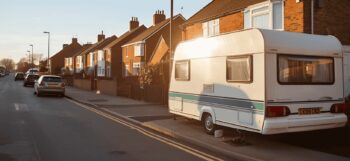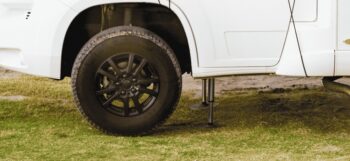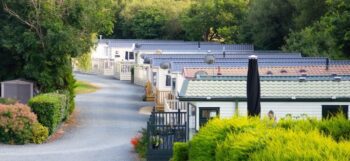If you’re a motorhome, caravan or campervan owner in the UK, you may be familiar with the term LPG.
Short for Liquefied Petroleum Gas, LPG is versatile fuel and a popular choice among motorhome, caravan and campervan owners who enjoy camping off-grid. In this article, we’ll delve into what LPG is, why it’s used by motorhome, caravan and campervan owners, the available options, and tips on finding LPG when you need it.
What is LPG?
LPG, or liquefied petroleum gas, is a mixture of hydrocarbons stored under pressure, in liquid form. It is particularly suited for use in motorhomes, caravans and campervans due to its portability, energy efficiency, and cleaner burning characteristics which make it an ideal choice for travel and camping. Understanding the properties and uses of LPG can help you, the motorhome, caravan or campervan enthusiast, to ensure you have a reliable fuel source for your adventures.
There are two types of LPG:

Along with its portability, LPG burns cleanly and efficiently, making it an environmentally friendly option compared to other fossil fuels
LPG use in Motorhomes, caravans and campervans
The use of LPG is multifunctional and can help to power essential systems such as fridges, heating systems and cookers.
It is a good energy source for off-grid travel as it can allow for extended periods without electric hook-ups. This independence can help to enhance your camping experience, enabling exploration of remote areas and sites without electric hookup points, without sacrificing comfort.

Where to find LPG
As a motorhome, caravan or campervan owner, you have several options when it comes to sourcing LPG.
Many petrol stations offer Autogas on pump, which is an efficient option for larger motorhomes. This fuel can be easily refilled while on the go. While the subject of petrol stations phasing out LPG pumps to make way for EV (electric vehicle) charging points is often a hot topic on motorhome, caravan and campervan forums, a lot of petrol stations still provide LPG, although it is said to be harder to come by. It may be wise to check availability at petrol stations, ahead of your journey.
Some useful resources for finding LPG stations include Autogas App, DriveLPG and MyLPG.
LPG canisters
UK companies like Calor Gas and Flogas provide portable LPG canisters. These are great for campervans and smaller motorhomes, offering flexibility when refuelling. Canisters can also be purchased at camping shops, local hardware stores, and online retailers. Keep an eye out for stockists in your area to ensure you’re prepared for your travels.

It’s worth noting that neither Calor nor Flogas are available in mainland Europe. If you are planning to travel around Europe for a few weeks, ensure you have a sufficient supply of gas to last the duration of your journey. The amount of gas you will need depends on the number of gas appliances you intend to run, their power output and how long they are in use for. This may be difficult to calculate, but if you stay on campsites with electric hook-up, two 6kg propane cylinders is considered sufficient for most people. Motorhome and caravan heating and water systems manufacturer Truma have an in depth guide on how to calculate gas consumption in a motorhome, here.
Ferry crossing providers do have limits on how much LPG you can carry, so be sure to check for current limits. If visiting Europe, an alternative would be to consider purchasing a gas bottle, and a regulator or adaptor for the country you are planning to visit.
Travelling with LPG and using LPG safely
While LPG is a convenient and efficient fuel source for motorhomes and campervans, safety should always be a priority. Here are some essential tips for using LPG safely:
Regular maintenance and inspections
Regularly inspect your LPG system for leaks. Use a soapy water solution on hoses and connectors; bubbles will form if there’s a leak. Ensure that your LPG appliances and storage cylinders are serviced regularly by a qualified technician. This can prevent potential malfunctions that could lead to safety hazards.
Turn off gas before you travel
Many motorhome and caravan gas systems require the gas supply to be shut off before travel. Movement can cause gas bottles and appliances to shift while on the road, which can ultimately put strain on hoses and connectors. This is turn could cause a potential gas leak. It is also safer to have your gas turned off, in the event of an accident.

Ventilation is key
Always ensure proper ventilation when using LPG appliances. Inadequate ventilation can lead to a build-up of harmful gases, such as carbon monoxide. It’s crucial to have a functioning carbon monoxide detector in your motorhome, caravan or campervan. This will alert you to potentially life-threatening gas accumulation.
Safe storage practices
Always keep LPG cylinders in an upright position and in a well-ventilated area, away from heat sources. LPG cylinders should not be exposed to direct sunlight or stored near heat-generating appliances.
Handling LPG canisters
Always read and follow the manufacturer’s instructions for the LPG canisters you are using. Use regulators and appropriate tools for connecting and disconnecting LPG and avoid using makeshift or improvised devices.
Emergency preparedness
Familiarise yourself with the emergency procedures related to LPG. Know how to shut off the gas supply in case of a leak. Have a fire extinguisher suitable for gas fires on board your motorhome or campervan and ensure that you and your travel companions know how to use it.
By following these safety guidelines, you can enjoy the benefits of LPG in your motorhome or campervan while minimising risks.
Protect your adventures
Mishaps can occur when you’re out on the road, so insurance is designed to offer peace of mind, the worst should happen.
As a specialist insurance broker we can help you to arrange insurance for your touring caravan, motorhome, or campervan. Why not visit https://www.lifesure.co.uk/ to learn more about our feature packed products or call us on 01480 402 460 to get a quote.
Disclaimer: The sole purpose of this article is to provide guidance on the issues covered. This article is not intended to give legal advice, and, accordingly, it should not be relied upon. It should not be regarded as a comprehensive statement of the law and/or market practice in this area. We make no claims as to the completeness or accuracy of the information contained herein or in the links which were live at the date of publication. You should not act upon (or should refrain from acting upon) information in this publication without first seeking specific legal and/or specialist advice. Arthur J. Gallagher Insurance Brokers Limited trading as Lifesure accepts no liability for any inaccuracy, omission or mistake in this publication, nor will we be responsible for any loss which may be suffered as a result of any person relying on the information contained herein.
FP1710-2025



